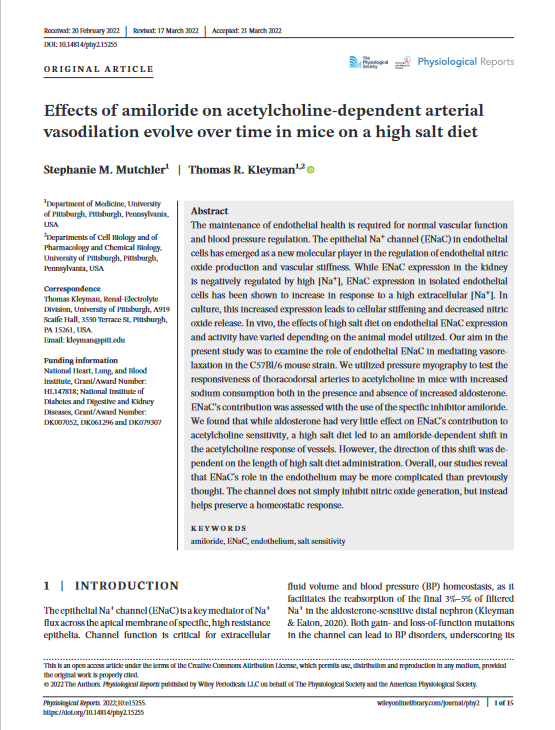20.01.2023
Effects of amiloride on acetylcholine-dependent arterial vasodilation evolve over time in mice on a high salt diet
Physiological Reports, 2022
Abstract
The maintenance of endothelial health is required for normal vascular function and blood pressure regulation. The epithelial Na+ channel (ENaC) in endothelial cells has emerged as a new molecular player in the regulation of endothelial nitric oxide production and vascular stiffness. While ENaC expression in the kidney is negatively regulated by high [Na+ ], ENaC expression in isolated endothelial cells has been shown to increase in response to a high extracellular [Na+ ]. In culture, this increased expression leads to cellular stiffening and decreased nitric oxide release. In vivo, the effects of high salt diet on endothelial ENaC expression and activity have varied depending on the animal model utilized. Our aim in the present study was to examine the role of endothelial ENaC in mediating vasorelaxation in the C57Bl/6 mouse strain. We utilized pressure myography to test the responsiveness of thoracodorsal arteries to acetylcholine in mice with increased sodium consumption both in the presence and absence of increased aldosterone. ENaC's contribution was assessed with the use of the specific inhibitor amiloride. We found that while aldosterone had very little effect on ENaC's contribution to acetylcholine sensitivity, a high salt diet led to an amiloride-dependent shift in the acetylcholine response of vessels. However, the direction of this shift was dependent on the length of high salt diet administration. Overall, our studies reveal that ENaC's role in the endothelium may be more complicated than previously thought. The channel does not simply inhibit nitric oxide generation, but instead helps preserve a homeostatic response.
Aldosterone ELISA kit ENZ-ADI-900-173 manufactured by our partner Enzo Life Sciences is featured in this study.


